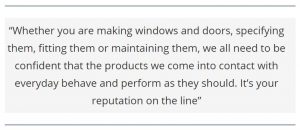“It’s your reputation on the line…”
“It’s your reputation on the line…”
Why better data means safer buildings in a post-Grenfell world
Adam Turk, CEO of Siderise and chair of the Construction Products Association Marketing Integrity Group, explains the new proposed Code for Construction Product Information and appeals to the glazing industry to help rebuild confidence, credibility and integrity in the construction industry in the wake of Grenfell.
In the aftermath of the Grenfell disaster, Dame Judith Hackitt was commissioned to carry out an independent review of Building Regulations and fire safety. Her final report – Building A Safer Future – included important recommendations for greater clarity in construction product information. The report also made clear that action was needed to ensure events like Grenfell never happened again.
Providing misleading product information is not common practice and in 30 years of working in the industry, I’ve found that most businesses operate with integrity. So, while they are in the minority, companies who provide false or misleading product information negatively impact the whole industry’s reputation.
To stand up to the credibility challenge facing construction and address the findings of the report, the Construction Products Association (CPA) established the Marketing Integrity Group (MIG) in 2018. I was appointed to lead the Group, alongside Polypipe divisional marketing director and MIG deputy chair, Catherine Fyfe.
Creating the Code
The first step was to understand what the industry thought, from both providers and users of product information. So we undertook a Call for Evidence survey in 2019, which received over 500 responses and almost 200 pages of free text information. It was clear from the detail submitted that change was needed and in particular that product information could be relied upon by those that depend on it. The MIG, as representatives of product manufacturers from across the construction supply chain, set about creating a new Code of Conduct.
This Code would ensure construction manufacturers provide reliable, accurate information – whether written in a brochure, a presentation, on a website or said in conversation – so users of product information have all the facts when making decisions about specifying or installing their products.
The Code would be voluntary but there would be encouragement to join and achieve widespread compliance. The alternative could be something devised and imposed by the Government, developed with minimal input and involvement from the industry.
Working with industry marketing and technical professionals, the Code for Construction Product Information (CCPI) was created. The Code is built around five ‘acid tests’, derived from the Call for Evidence survey where most people told us that to be trustworthy, product information must be Clear, Accurate, Up-to-date, Accessible and Unambiguous.
The Code has 11 clauses and is broken down into four main sections:
1. Information creation
Ensure rigorous sign off procedures are in place, that version control is used so the latest information is always available and ending the practice of misleading and/or ambiguous wording or images.
2. Core information
Where performance or compliance information is given, it must be supported by evidence.
3. Associated information
This covers information regarding the handling, installation, operation, maintenance and disposal of construction products. This section also covers guarantees and warranties, to ensure manufacturers are transparent about what is covered, excluded and required to comply with any terms and conditions.
4. Support and competence
Ensuring that people providing support and advice have sufficient training and knowledge for their role.
Management & auditing
For this Code to truly make a difference, it’s important compliance is independently assessed and verified. We don’t want manufacturers ‘marking their own homework’, but equally, we need to recognise the effort behind compliance. So the CPA, with the support of the Considerate Constructors Scheme (CCS), have established Construction Product Information Limited (CPIL) – an independent, not-for-profit organisation that will be responsible for administering and managing the forthcoming Code, and auditing registrants. CPIL will have an independent Board as its governance structure with Amanda Long, CEO of CCS also taking on the CEO role for CPIL. All successful assessments will be given a numbered licence to demonstrate compliance with the CCPI. The licence will be valid for one year and subject to ongoing assessment.
Working together for change
Ideally, we’d like the Code to go live in June 2021, with the first companies being CCPI approved by the end of the year. But before we reach that point, we need your help.
We are running an industry-wide consultation from 1 February 2021 to 31 March 2021 to gather feedback on the Code, its launch and the ongoing management and policing of it.
Why are we asking you to take part? Because we are all in this together. Construction products are used throughout the life cycle of a building and have a critical impact on safety, energy efficiency and performance. Whether you are making windows and doors, specifying them, fitting them or maintaining them, we all need to be confident that the products we come into contact with everyday behave and perform as they should. It’s your reputation on the line.
The country is watching how we respond to Grenfell and while our industry’s integrity has been damaged, we can demonstrate our strength by rising to the challenge and building a legacy of safer buildings.
For more information, read the Consultation report and then tell us what you think before 31 March 2021.


